A primary activity of NYKids is to conduct research and identify promising practices in odds-beating schools.
Results of each study are available in multiple formats and include reports that summarize the results of each study; best practice frameworks that offer comparisons of higher- and typically-performing schools and sample documents from the odds-beating performers; and case studies of the individual higher-performing, odds-beating schools studied.
Apply Any Combination of Filters to Refine Your Results
Filters
Search Results (189)
NYKids 20th Anniversary Study: Promising Practices from Persistent and Emergent Positive Outlier Schools
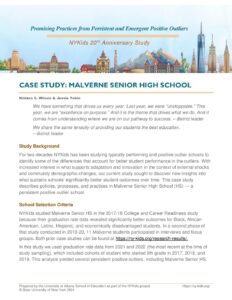
In our latest study, Promising Practices from Persistent and Emergent Positive Outlier Schools, we returned to schools identified as positive outliers in prior NYKids studies as well as typically-performing yet who have risen to positive outlier status. The study seeks to understand what accounts for these schools’ comparatively better outcomes for culturally, linguistically, and socio-economically diverse youth. The first case study of these schools is Malverne Senior High School, identified as a positive outlier in our 2018 College and Career Readiness study.
Fillmore Central School: Promising Practices from Persistent and Emergent Positive Outliers NYKids 20th Anniversary Study: Promising Practices from Persistent and Emergent Positive Outlier Schools
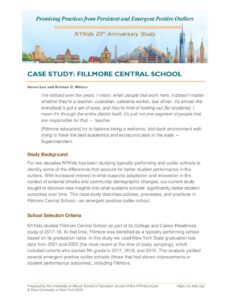
In our latest study, Promising Practices from Persistent and Emergent Positive Outlier Schools, we returned to schools identified as positive outliers in prior NYKids studies as well as typically-performing schools that have risen to positive outlier status. The study seeks to understand what accounts for these schools’ comparatively better outcomes for culturally, linguistically, and socio-economically diverse youth. In our second case study we visited Fillmore Central School, our first school identified as an emergent positive outlier.
Crown Point Central School: Promising Practices from Persistent and Emergent Positive OutliersNYKids 20th Anniversary Study: Promising Practices from Persistent and Emergent Positive Outlier Schools
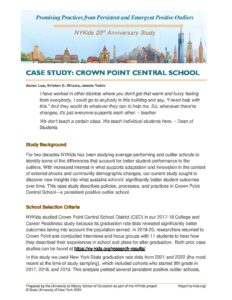
In our latest study, Promising Practices from Persistent and Emergent Positive Outlier Schools, we returned to schools identified as positive outliers in prior NYKids studies as well as typically-performing yet who have risen to positive outlier status. The study seeks to understand what accounts for these schools’ comparatively better outcomes for culturally, linguistically, and socio-economically diverse youth. The first case study of these schools is Crown Point Central School, identified as a positive outlier in our 2018 College and Career Readiness study.
NYKids Equity in Education Collaborative Research BriefResearch-Practice Partnerships in the COVID-19 Pandemic: Lessons from the NYKids Equity in Educational Collaborative
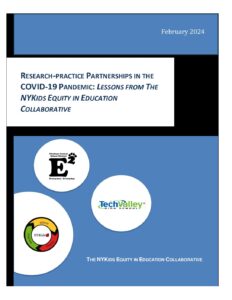
This report details the lessons learned through the Research-Practice Partnership between NYKids, Tech Valley High School (TVHS), Chatham Central School District (CSD), and the American Institutes for Research (AIR). The report, co-written by members of the collaborative, reflects on positive outcomes from the RPP, challenges team members faced, and future goals for improvement.
ICSEI 2024 PresentationThis presentation was delivered by Kristen C. Wilcox at the International Congress of School Effectiveness and Improvement held in Dublin, January 8-12, 2024.
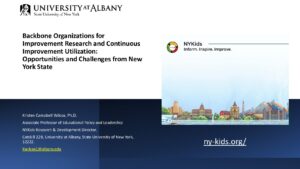
In this presentation entitled “Backbone Organizations for Improvement Research and Continuous Improvement Utilization: Opportunities and Challenges from New York State” NYKids Director and Associate Professor of Educational Policy and Leadership, Kristen C. Wilcox details the continuous improvement efforts made by NYKids and our partners across New York State.
American Anthropological Association 2023 – PresentationThis presentation was given by Aaron Leo, Assistant Director of Research for NYKids, at the American Anthropological Association’s annual conference held this year in Toronto, Canada.
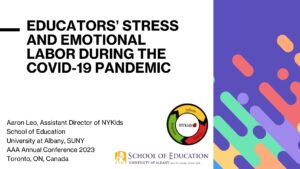
Dr. Aaron Leo presented research from NYKids’ latest study of Adaptation and Innovation during the COVID-19 pandemic at the American Anthropological Association’s annual conference held in Toronto, Canada in November, 2023. The paper, co-written with Dr. Kristen C. Wilcox was entitled “Educators’ stress and emotional labor during the COVID-19 pandemic” and drew on data gathered among 88 educators across New York State. Dr. Leo delivered the paper alongside other researchers on a panel focusing on teacher and student agency during the pandemic.
Educational Leaders Without Borders 2023 – PresentationThis presentation was given by NYKids Director Kristen C. Wilcox and Dr. Hal A. Lawson during the 2023 Educational Leaders without Borders conference held in Athens, Greece.

This presentation, entitled “Advancing Educational Equity Research, Policy, and Practice,” was delivered by NYKids Director Kristen C. Wilcox and longtime collaborator Hal A. Lawson at the Educational Leaders without Borders conference held in Athens, Greece in April, 2023. The presentation discusses the importance of equity-focused research and recounts over two decades of NYKids scholarship.
AERA 2023 – Presentation HandoutThis handout was created by NYKids presenters Aaron Leo and Kristen C. Wilcox for the AERA Annual Conference
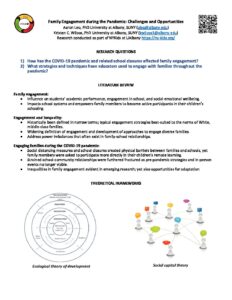
NYKids Assistant Director Aaron Leo and Director Kristen C. Wilcox attended participated in a roundtable at the 2023 AERA Annual Conference held in April, 2023. The presentation was titled “Family Engagement during the Pandemic: Challenges and Opportunities” and drew on data from NYKids’ latest study of pandemic-related adaptations among six schools throughout New York State.
Carnegie Summit Poster 2023This poster was presented at the 2023 Carnegie Summit by NYKids team members Kristen C. Wilcox, Maria I. Khan, and Jessie Tobin. The title of the poster is “Addressing Differential Impacts of COVID via a National Research-Practice Partnership Network.”
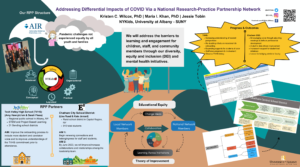
NYKids team members Kristen C. Wilcox, Maria I. Khan, and Jessie Tobin presented this poster at the 2023 Carnegie Summit held in San Diego. The poster, titled “Addressing Differential Impacts of COVID via a National Research-Practice Partnership Network” outlines research improvement work NYKids has connected as part of a collaboration with Tech Valley High School, Chatham City School District, and American Institutes for Research.
Opportunities and Challenges to Adapt and Innovate: Research BriefOpportunities and Challenges to Adapt and Innovate: Research Brief
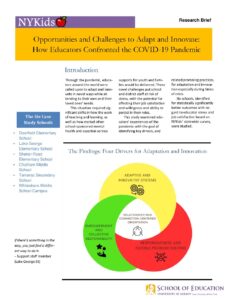
This research brief outlines the major findings from NYKids’ latest study on the effects of the pandemic on the educator workforce. The full report, “Opportunities and Challenges to Adapt and Innovate: How Educators Confronted the COVID-19 Pandemic,” was published in December, 2022 and is available on our website. The brief succinctly describes the four drivers for adaptation and innovation found in positive outlier schools that participated in the study: Empowerment and Collective Responsibility; Responsiveness and Flexible Problem Solving ; A Relationship- and Connection-Centered Orientation; and Adaptive and Innovative Systems.
Stakeholder Empowerment: Research Results on Adaptive Leadership During ChangePresentation delivered at the 2023 New York State Council of School Superintendents
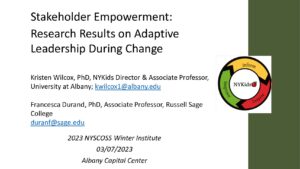
In this presentation titled “Stakeholder Empowerment: Research Results on Adaptive Leadership During Change” NYKids Director Kristen C. Wilcox and Associate Professor at Russell Sage College Francesca Durand discuss findings related to leadership drawn from NYKids’ study of the pandemic’s impacts on educators throughout New York State.
Remote Schooling during the COVID-10 Pandemic: A Case Study of Impacts on Children in a High Poverty, High Diversity SchoolPresentation delivered at the Comparative and International Education Society Annual Conference, February, 2023.
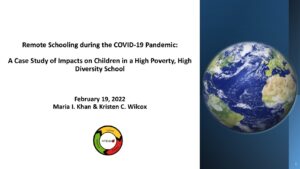
In this presentation, Maria I. Khan and Kristen C. Wilcox discuss findings from an research conducted at an urban, diverse elementary school with high rates of poverty. The presentation “Remote Schooling during the COVID-10 Pandemic: A Case Study of Impacts on Children in a High Poverty, High Diversity School” was presented at the Comparative and International Education Society’s Annual Conference.
Improving Educational Equity through Research-Practice Partnerships & University-School Collaborations in the Post-Pandemic EraPresentation delivered at the Comparative and International Education Society Annual Conference, February, 2023.
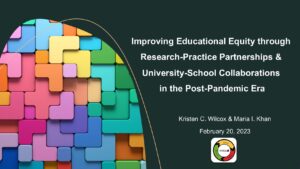
NYKids team members Kristen C. Wilcox and Maria I. Khan presented findings from an ongoing research study at the Comparative and International Education Society. The presentation, entitled “Improving Educational Equity through Research-Practice Partnerships & University-School Collaborations in the Post-Pandemic Era,” explores the research-practice partnership between NYKids, Chatham Central School District, and Tech Valley High School. This work is also being conducted with the support of the American Institutes for Research.
University Council for Educational Administration 2022 Conference BriefUniversity Council for Educational Administration 2022 Conference Brief
New Frameworks to Support University-School Partnership Improvement Hubs: A Conceptual Paper
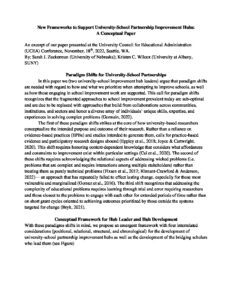
In this conference brief Sarah Zuckerman and Kristen Wilcox describe paradigm shifts which they feel are needed with regard to how and what we prioritize when attempting to improve schools, as well as how those engaging in school improvement work are supported.
Opportunities and Challenges to Adapt and Innovate: How Educators Confronted the COVID-19 PandemicOpportunities and Challenges to Adapt and Innovate: How Educators Confronted the COVID-19 Pandemic
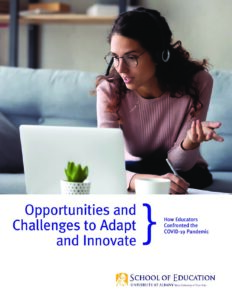
NYKids’ latest report, “Opportunities and Challenges to Adapt and Innovate: How Educators Confronted the COVID-19 Pandemic,” features data gathered among 88 educators from 6 schools across New York State. The study offers important findings related to adaptation and innovation in the context of the COVID-19 pandemic and provides insight into the challenges faced by school districts as well as the promising adaptations and innovations such crises prompt.
Shaker Road Elementary School: A Study of Educators’ Experiences during the COVID-19 PandemicOpportunities and Challenges for Adaptation and Innovation: A Study of Educators’ Experiences during the COVID-19 Pandemic
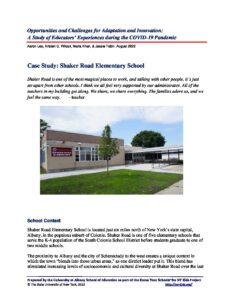
This case study report, “Opportunities and Challenges for Adaptation and Innovation: A Study of Educators’ Experiences during the COVID-19 Pandemic” is part of NYKids’ research project investigating the impacts on educators during the COVID-19 pandemic. This report focuses on the experiences, adaptations, and innovations of educators at Shaker Road Elementary School in Colonie, New York.
Tamarac Secondary School: A Study of Educators’ Experiences during the COVID-19 PandemicOpportunities and Challenges for Adaptation and Innovation: A Study of Educators’ Experiences during the COVID-19 Pandemic
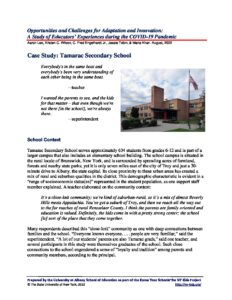
This case study report, “Opportunities and Challenges for Adaptation and Innovation: A Study of Educators’ Experiences during the COVID-19 Pandemic” is part of NYKids’ research project investigating the impacts on educators during the COVID-19 pandemic. This report focuses on the experiences, adaptations, and innovations of educators at Tamarac Secondary School in Troy, New York.
Chatham Middle School: A Study of Educators’ Experiences during the COVID-19 PandemicOpportunities and Challenges for Adaptation and Innovation: A Study of Educators’ Experiences during the COVID-19 Pandemic
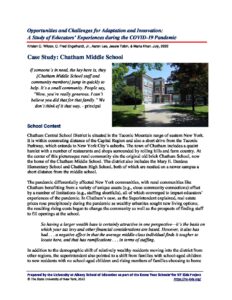
This case study report, “Opportunities and Challenges for Adaptation and Innovation: A Study of Educators’ Experiences during the COVID-19 Pandemic” is part of NYKids’ research project investigating the impacts on educators during the COVID-19 pandemic. This report focuses on the experiences, adaptations, and innovations of educators at Chatham Middle School in Chatham, New York.
Lake George Elementary School: A Study of Educators’ Experiences during the COVID-19 PandemicOpportunities and Challenges for Adaptation and Innovation: A Study of Educators’ Experiences during the COVID-19 Pandemic
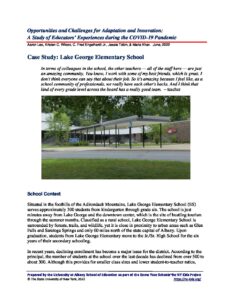
This case study report, “Opportunities and Challenges for Adaptation and Innovation: A Study of Educators’ Experiences during the COVID-19 Pandemic” is part of NYKids’ research project investigating the impacts on educators during the COVID-19 pandemic. This report focuses on the experiences, adaptations, and innovations of educators at Lake George Elementary School in Lake George, New York.
Whitesboro Middle School: A Study of Educators’ Experiences during the COVID-19 PandemicOpportunities and Challenges for Adaptation and Innovation: A Study of Educators’ Experiences during the COVID-19 Pandemic
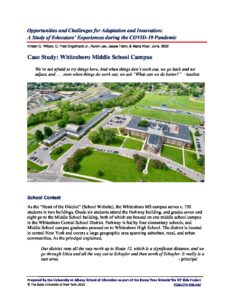
This case study report, “Opportunities and Challenges for Adaptation and Innovation: A Study of Educators’ Experiences during the COVID-19 Pandemic” is part of NYKids’ research project investigating the impacts on educators during the COVID-19 pandemic. This report focuses on the experiences, adaptations, and innovations of educators at Whitesboro Middle School in Whitesboro, New York.
Deerfield Elementary School: A Study of Educators’ Experiences during the COVID-19 PandemicOpportunities and Challenges for Adaptation and Innovation: A Study of Educators’ Experiences during the COVID-19 Pandemic
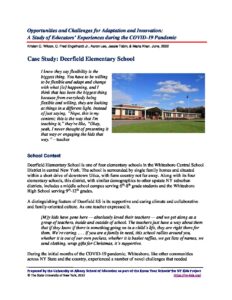
This case study report, “Opportunities and Challenges for Adaptation and Innovation: A Study of Educators’ Experiences during the COVID-19 Pandemic” is part of NYKids’ research project investigating the impacts on educators during the COVID-19 pandemic. This report focuses on the experiences, adaptations, and innovations of educators at Deerfield Elementary School in Whitesboro, New York.
Minority Health Disparities Research StudyMinority Health Disparities: Research Study: Remote Schooling and Adverse Childhood Events during COVID 19
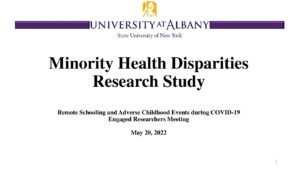
This Engaged Researchers Meeting discussed findings from an ongoing study conducted by researchers in the School of Public Health, Public Administration and Policy, and the School of Education. The purpose of this study is to examine the effects of remote schooling on the occurrence of adverse childhood events among children in New York State. Researchers also seek to uncover the experiences of caregivers and educators during the pandemic and develop community-informed recommendations to develop trauma informed interventions in schools.
AERA 2022 – Rural School AdaptationsThis AERA presentation discusses how NYKids functions as an RPP and how it uses improvement science as a foundation for the work via an innovation called COMPASS.
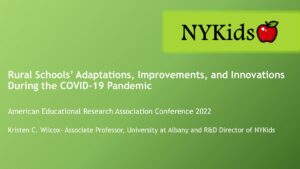
The NYKids paper entitled “A Rural Research-Practice Partnership’s Adaptations during the COVID-19 Pandemic” was delivered as part of the American Educational Research Association’s annual conference in 2022. It outlines how improvement science principles were used to support Fort Plain Jr.Sr. High School’s planning and improvement efforts as they tackled pandemic-related disruptions
AERA 2022 – Peer relationshipsThis presentation, entitled “Fostering positive peer relationships: a qualitative study of two secondary schools,” was presented at the 2022 American Educational Research Association’s annual conference held in San Diego.
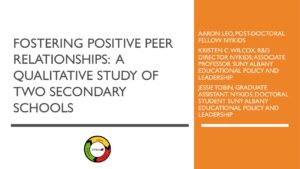
At the 2022 American Educational Research Association’s Annual Conference, NYKids Graduate Assistant Jessie Tobin presents findings from our College and Career Readiness Study related to peer relationships. The presentation, entitled “Fostering positive peer relationships: a qualitative study of two secondary schools,” explores ways in which educators and students at positive outlier schools fostered positive relationships among peers.
Carnegie Summit 2022 – Decolonizing PedagogyDr. Kristen C. Wilcox and Dr. Tammy Ellis-Robinson presented work on decolonizing pedagogies at the 2022 Carnegie Summit
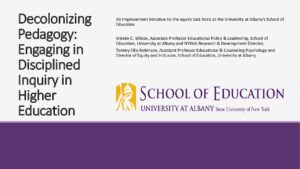
This slide deck is taken from a presentation at the 2022 Carnegie Summit by Dr. Kristen C. Wilcox and Dr. Tammy Ellis-Robinson. The presentation entitled, “Decolonizing Pedagogy: Engaging in Disciplined Inquiry in Higher Education” explores efforts of the Diversity, Equity, Inclusion, and Justice Task Force at UAlbany’s School of Education.
